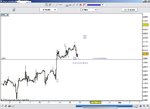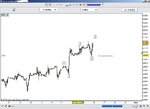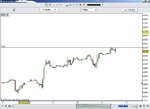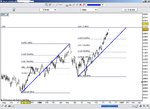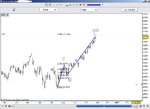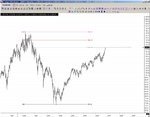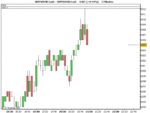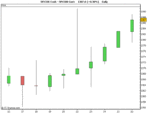Bull Market? Don't Bet on It
Rick Ackerman
October 27, 2006
A few words concerning my oddly rosy forecast for the Dow Industrials. My prediction that the blue chip average eventually will achieve 13045 was not inspired by any particular thought, nor by events that may have occurred or which could conceivably occur, in the real world. It is in fact a coldly mechanical objective derived from the long-term charts and in its coldly mechanical way, it implicitly acknowledges the fact that stocks can do just about anything without heed to events in what we should like to call the “real” world. They can tumble into a relentless bear market just when the economy seems to be going gangbusters; they can do essentially nothing for seven years, no matter what the news; or they can soar, as they are doing now, even with a spectacular and potentially depressionary real estate bust glowering on the horizon.
But merely because my long-term charts point to an impending 900-point rally in a handful of Dow stocks does not necessarily mean we should become hand-over-fist buyers at these levels. In fact, we are only ultra-cautious buyers on pullbacks, even as we treat every Hidden Pivot rally target, no matter how minor, as a potential very long-term top -- and a shorting opportunity.
Headline highs aside, is it really a bull market? As Richard Russell once taught us, the fact that the stock market is making new all-time highs does not necessarily qualify it as a true bull. In his latest newsletter, Bob Prechter recalls Russell’s prescience on this point 33 years ago: “I can recall reading Richard Russell’s Dow Theory Letters in 1973, and he correctly said that the new highs in the Dow and S&P were part of a bear market. To many people this claim did not make sense, but he was correct. It was a corrective pattern under Elliott, other averages (like the NASDAQ and S&P today) were lagging, the real value of the indexes was not a new high, and the worst of the bear was yet to come.”
Just so. Prechter closes his letter with a statement that has caused me to rethink my own role as a forecaster who has predicted significantly higher stock prices: “At this point it would be dangerous to suggest the Dow will go up another 8 percent in case some people were to take it as a reason to buy,” writes Prechter. “The responsible thing to do in this psychological environment has been, and still is, to recognize every possible juncture that could signal a top…”
I completely agree. And I would add that anyone who believes that the already fatal drop in home prices is leading the economy toward a soft landing is too stupid to argue with. The stock market and the entire economic system are so very close to unraveling that we should offer up a grateful prayer for each new and uneventful day on Wall St.

